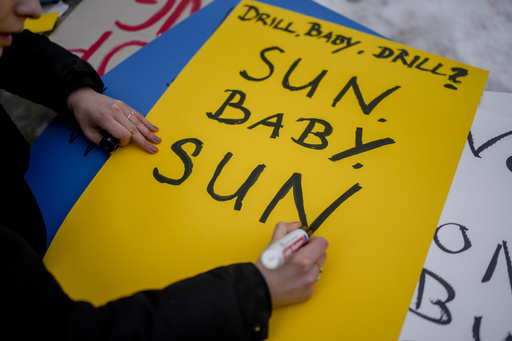
DAVOS, Switzerland — The United Nations secretary-general has intensified his warnings regarding climate change, describing the global dependency on fossil fuels as a “Frankenstein monster” that has far-reaching consequences. He also raised concerns about the threats posed by uncontrolled artificial intelligence, urging attention to these risks during discussions at the World Economic Forum’s annual gathering.
António Guterres took center stage on Wednesday, amidst a series of discussions attended by prominent world leaders, including the prime ministers of Spain and Malaysia, as well as business executives and academics. The agenda covered various subjects such as potential economic growth opportunities in China and Russia, the benefits and drawbacks of AI, and the evolving political landscape in Washington following President Donald Trump’s recent inauguration.
Ukrainian President Volodymyr Zelenskyy was also present, engaging with notable figures like Israeli President Isaac Herzog, Germany’s opposition leader Friedrich Merz, and Vietnam President Luong Cuong, all as part of his efforts to garner support for Ukraine in its ongoing conflict with Russia.
During the events on Wednesday, Guterres reiterated his calls for urgent action against climate change, pinpointing the fossil fuel industry as a significant contributor to global warming. He noted that the year 2024 marked the hottest on record and cautioned that rising sea levels threaten major shipping ports.
“Our addiction to fossil fuels resembles a monstrous creation that spares no one,” he remarked, pointing to escalating temperatures predominantly caused by fossil fuel combustion. He criticized companies that have reneged on their sustainability promises, stating that they are “on the wrong side of history.”
On the topic of artificial intelligence, Guterres recognized its transformative potential in sectors like education and healthcare but cautioned against its unregulated development. He warned that without proper governance, AI could be exploited for deception or might incite distrust in societal institutions and disrupt labor markets, thereby exacerbating existing inequalities.
A day prior, President Trump noted a substantial joint venture aiming to inject up to $500 billion into AI-related infrastructure, created through a partnership involving Oracle, SoftBank, and OpenAI. This initiative, dubbed the Stargate project, aspires to develop the necessary data centers and energy resources essential for supporting the insatiable power requirements of advancing AI technologies, particularly in Texas.
Julie Sweet, the CEO of Accenture, praised the Stargate initiative, describing it as a substantial affirmation of AI’s significance for businesses and nations alike in driving innovation. She indicated that the United States appears poised to adopt an “innovation first” strategy regarding AI, followed by the establishment of appropriate regulatory measures, contrasting with regions that prioritize regulation beforehand.
Sweet emphasized, “For AI to thrive, it is crucial that it garners public trust,” while expressing confidence that concerns over excessive deregulation do not overshadow efforts to ensure AI remains credible across various sectors.
The topic of artificial general intelligence, representing a vision of machines achieving human-level intelligence or performing multiple tasks equally as well, has raised alarms among governments worldwide. Some experts warn that unchecked AI capabilities might present existential threats due to their potential for complex, long-term planning.
Malaysian Prime Minister Anwar Ibrahim expressed his intent to steer his country towards embracing AI more rapidly, a pursuit motivated by a sense of urgency. Anwar’s remarks came after Malaysia and Singapore reached an agreement to establish a special economic zone aimed at stimulating job creation and attracting investment.
Spain’s Prime Minister Pedro Sánchez is set to deliver a speech as EU leaders continue their assessment of Trump’s return to power, particularly his expressed intentions regarding tariffs on both allies and adversaries in the near future. Trump’s recent comments appeared to erroneously categorize Spain, a resilient EU economy, alongside the BRICS group of developing nations.

